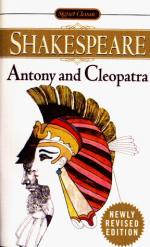|
This section contains 7,238 words (approx. 25 pages at 300 words per page) |

|
SOURCE: “That I Might Hear Thee Call Great Caesar ‘Ass Unpolicied,’” in Papers on Language and Literature, Vol. 33, No. 3, Summer, 1997, pp. 244-64.
In the following essay, Levin studies three conundrums appearing in the negotiations of Cleopatra and Caesar, and examines how these episodes illuminate the battle of wits between the two characters. This examination helps to inform Levin’s understanding of Cleopatra's decision to commit suicide.
Near the end of Shakespeare's Antony and Cleopatra, the Egyptian queen apostrophizes the deadly asp which she takes to her bosom: “O, couldst thou speak, / That I might hear thee call great Caesar ass / Unpolicied!” (5.2.300-02).1 Were Cleopatra only claiming that her suicide affirms a love for Antony nobler than any value in Caesar's world of cold political calculation, we would endorse her assertion. But her claim is disingenuous to the extent that until this moment she spoke of suicide yet sought...
|
This section contains 7,238 words (approx. 25 pages at 300 words per page) |

|


